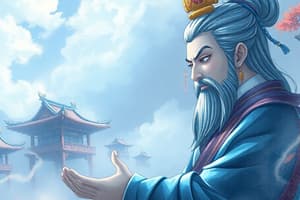Podcast
Questions and Answers
Match the following concepts with Confucius' beliefs about social hierarchy:
Match the following concepts with Confucius' beliefs about social hierarchy:
Moral character = Basis of the hierarchical society Respect for authority = Importance of social relationships Virtuous and wise = Ruling over the common people Clear division of roles = Everyone knowing their place
Match the following qualities with Confucius' expectations of a moral leader:
Match the following qualities with Confucius' expectations of a moral leader:
Moral character = More important than power or wealth Fair and just = Setting a good example Personal cultivation = Prioritizing the welfare of the people Virtues = Possession of moral character
Match the following goals with Confucius' beliefs about education for governance:
Match the following goals with Confucius' beliefs about education for governance:
Moral development = Preparing individuals for public service Self-cultivation = Developing a sense of moral purpose Virtues = Studying the classics, history, and literature Public service = Focusing on moral development
Match the following benefits with Confucius' beliefs about rituals and governance:
Match the following benefits with Confucius' beliefs about rituals and governance:
Match the following roles with Confucius' beliefs about the role of the state:
Match the following roles with Confucius' beliefs about the role of the state:
Match the following characteristics with Confucius' beliefs about a hierarchical society:
Match the following characteristics with Confucius' beliefs about a hierarchical society:
Match the following concepts with Confucius' beliefs about moral leadership:
Match the following concepts with Confucius' beliefs about moral leadership:
Match the following benefits with Confucius' beliefs about education and governance:
Match the following benefits with Confucius' beliefs about education and governance:
Flashcards are hidden until you start studying
Study Notes
Social Hierarchy
- Confucius believed in a hierarchical society with a clear division of roles and responsibilities.
- He advocated for a system where everyone knew their place and respected their superiors.
- The hierarchy was based on moral character, with the virtuous and wise ruling over the common people.
- Confucius emphasized the importance of social relationships and the duties that come with each role.
Moral Leadership
- Confucius believed that a good ruler should possess moral character and virtues.
- He emphasized the importance of personal cultivation and self-reflection for leaders.
- A moral leader should set a good example, be fair, and just, and prioritize the welfare of the people.
- Confucius argued that a ruler's moral character is more important than their power or wealth.
Education For Governance
- Confucius believed that education was essential for good governance.
- He advocated for education that focused on moral development, self-cultivation, and the development of virtues.
- Confucius believed that education should prepare individuals for public service and leadership.
- He emphasized the importance of studying the classics, history, and literature to develop a sense of moral purpose and responsibility.
Rituals And Governance
- Confucius believed that rituals and ceremonies played a crucial role in governance.
- He saw rituals as a way to promote social order, respect for authority, and moral values.
- Confucius believed that rituals should be performed with sincerity and reverence, and that they should be used to promote social harmony and cohesion.
- He emphasized the importance of rituals in maintaining the social hierarchy and promoting a sense of community.
Role Of The State
- Confucius believed that the state should play a limited role in people's lives.
- He advocated for a minimalist approach to government, where the state only intervened in matters of national security, defense, and justice.
- Confucius believed that the state should focus on promoting moral values and education, rather than trying to control every aspect of people's lives.
- He emphasized the importance of individual moral development and personal responsibility, rather than relying on the state to solve all problems.
Social Hierarchy
- Confucius believed in a hierarchical society with clear divisions of roles and responsibilities based on moral character.
- The virtuous and wise ruled over the common people, with everyone knowing their place and respecting their superiors.
- He emphasized the importance of social relationships and the duties that come with each role.
Moral Leadership
- A good ruler should possess moral character and virtues, such as fairness, justice, and a prioritization of the people's welfare.
- Personal cultivation and self-reflection were essential for leaders to set a good example.
- Moral character was more important than power or wealth for a ruler.
Education For Governance
- Education focused on moral development, self-cultivation, and virtues was essential for good governance.
- Confucius believed that education should prepare individuals for public service and leadership.
- Studying the classics, history, and literature helped develop a sense of moral purpose and responsibility.
Rituals And Governance
- Rituals and ceremonies promoted social order, respect for authority, and moral values.
- Rituals should be performed with sincerity and reverence to promote social harmony and cohesion.
- They maintained the social hierarchy and promoted a sense of community.
Role Of The State
- Confucius advocated for a minimalist approach to government, intervening only in national security, defense, and justice.
- The state should focus on promoting moral values and education rather than controlling every aspect of people's lives.
- Individual moral development and personal responsibility were more important than relying on the state to solve problems.
Studying That Suits You
Use AI to generate personalized quizzes and flashcards to suit your learning preferences.




